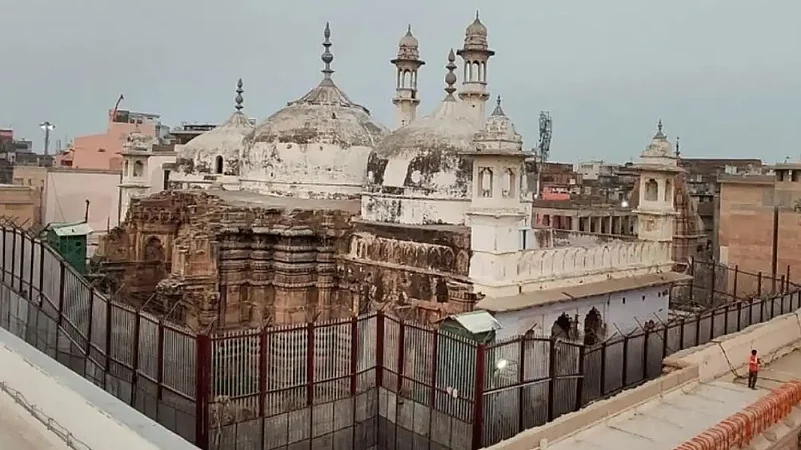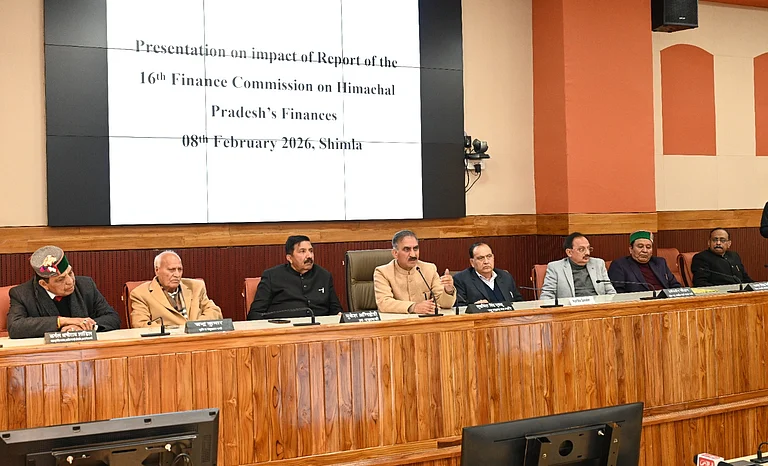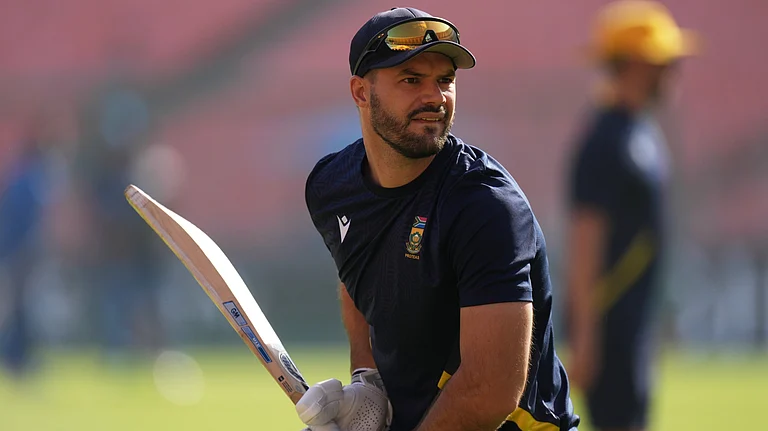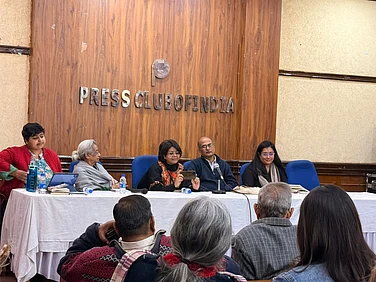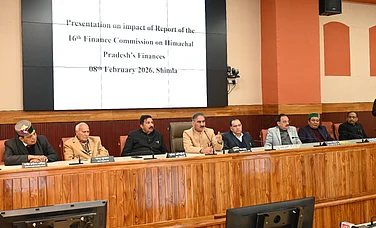The Varanasi District Court in Uttar Pradesh on Monday ruled that the petition of Hindu devotees in the Gyanvapi Mosque case is maintainable, rejecting the challenge to the petition by Anjuman Intezamia Masjid Committee.
Hindu petitioners have sought permission for daily prayers before the idols on outer walls of the Gyanvapi mosque. The Muslim petitioners had challeged the maintainability of the Hindu petitioners' plea, arguing that it was not maintainable under the Places of Worship Act 1991 which prohibits conversion of any place of worship and mandates the maintenance of the religious character of any place of worship as it existed on August 15, 1947.
The court also ruled to continue the hearing of the case. The next date of hearing is September 22.
The Anjuman Intezamia Masjid Committee had said the Gyanvapi mosque is a Waqf property and had questioned the maintainability of the plea. Madan Mohan Yadav, a lawyer of the Hindu side, had said that the mosque was constructed after demolishing the temple.
"Muslim side will continue with its arguments. According to them, the case is not maintainable, but we've said that it's maintainable. Our demand to grant worship there is legally valid," said Advocate Vishnu Shankar Jain earlier, appearing for the Hindus, according to ANI.
The Gyanvapi mosque is located close to the Kashi Vishwanath temple. A Varanasi civil court had ordered the survey of the mosque complex while hearing a petition by five Hindu women seeking permission for daily prayers before the idols on its outer walls. It was claimed that a shivling was found in the mosque compound during the survey.
Tight security ahead of court order
Prohibitory orders were clamped and security was tightened in Varanasi ahead of the district court's order on Monday.
Police Commissioner A Satish Ganesh said on Sunday that prohibitory orders have been issued in the Varanasi commissionerate and officers have been asked to interact with religious leaders in their respective areas to ensure that peace is maintained.
To maintain law and order, he said, the entire city has been divided into sectors which have been allocated police force as per their requirement, adding that directives for flag march and foot march in sensitive areas have also been issued.
Ganesh further said that checking has been intensified in the district's border areas, hotels, and guest houses, while an eye is being also kept on social media.
The Gyanvapi case proceedings so far
The court-appointed commission that surveyed the mosque complex submitted its report on May 19.
Vishnu Shankar Jain, the counsel for the Hindu side, told reporters in May that the court has categorically stated that the report on the videography survey of the complex will be made available to all the parties, but only the court will tell the conditions for this.
Earlier, the Supreme Court on May 20 transferred the civil suit filed by Hindu devotees on Gyanvapi mosque from civil judge (senior division) to district judge of Varanasi, citing complexities and sensitivity of the case and saying it is better for a senior judicial officer to handle it.
The apex court directed the district judge to first decide the application under Order 7 Rule 11 of CPC on maintainability filed by the Mosque committee saying the civil suit is barred by a law of Parliament.
The apex court said that its earlier interim order of May 17 directing protection of the area where "shivling" is said to be found and allowing Muslims to offer namaz in mosque premises shall remain in operation till the maintainability of the suit is decided by the district judge and thereafter for eight weeks to allow the aggrieved parties to approach the higher court.
The bench also directed the district magistrate to make adequate arrangements for "wazu" (ablution) for the Muslims coming for offering namaz in the mosque in consultation with the parties involved in the dispute.
On May 19, Special Advocate Commissioner Vishal Singh submitted the report of the survey work carried out on May 14-16 in the court of the District Civil Judge Ravi Kumar Diwakar, said advocate Madan Mohan Yadav, who is representing the Hindu side in the case. He added that Ajay Mishra, who was removed by the court as the advocate commissioner, had also filed a report on the survey conducted by him on May 6-7.
Earlier, a Varanasi court on May 16 ordered the spot in the Gyanvapi complex to be sealed where a "shivling" was reportedly found during the videography and survey of the complex.
Madan Mohan Yadav, an advocate of the Hindu side, earlier claimed that the survey team found shivling in the complex near "wazookhana" — a place inside a mosque where people wash hands before offering namaaz.
Here is a brief history of the case
Petitioner: The petitioner says that the self-styled Jyotirling of Lord Vishwanath in Kashi (Varanasi in Uttar Pradesh) is in the Gyanvapi complex. The petitioner also claimed Mughal Emperor Aurangzeb had destroyed a portion of the Kashi Vishwanath temple in 1669 and built a mosque named Gyanvapi Masjid. The petitioner wants the court to declare that Muslims have no right to occupy the Gyanvapi Masjid site and their entry should be barred.
Defence: The defence says that there was no temple in the Gyanvapi complex and the mosque is standing on the site from the very beginning.
Here we look at the timeline of events in Kashi Vishwanath Temple-Gyanvapi Mosque Complex case that is making headlines again.
Timeline:
In 1991, the first petition in the case was filed in Varanasi court by Swayambhu Jyotirlinga Bhagwan Vishweshwar. The petitioner had sought permission to worship in Gyanvapi complex.
He had placed three demands before the court including that the court should declare the entire Gyanvapi complex as a part of the Kashi temple.
Besides, he also sought eviction of Muslims from the complex area and also sought mosque in the complex to be demolished. The petitioner had also pleaded before the court that Hindus should be given permission to rebuild the temple.
In 1998, Anjuman Intezamia Masjid Committee filed a case at the Allahabad High Court. The committee in their plea before the court asserted that the temple-mosque land dispute could not be adjudicated by a civil court as it was barred by the law. It was on the directions of the high court that the proceedings in the lower court got stayed which continued for the past 22 years.
In 2019, a person named Rastogi filed a plea on behalf of Swayambhu Jyotirlinga Bhagwan Vishweshwar in Varanasi district court. The petitioner demanded that an archaeological survey of the entire Gyanvapi mosque complex should be carried out. In his plea, the petitioner mentioned himself as the "next friend" of Swayambhu Jyotirlinga Bhagwan Vishweshwar.
In 2020, Anjuman Intezamia Masjid Committee opposed the petition seeking ASI survey of the entire Gyanvapi complex. In the same year, the petitioner again approached the lower court with a petition, requesting to resume the hearing as the Allahabad High Court had not extended the stay further.
Now, the court is hearing a petition by five Hindu women seeking daily prayers before the idols on the mosque's outer wall. Following the survey and the reported finding of a shivling inside the complex, the court ordered the spot in the complex to be sealed.
(With PTI inputs)






